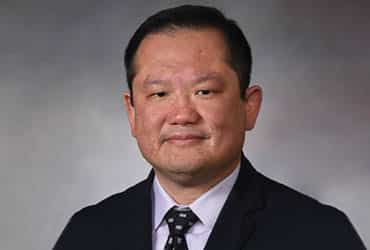Eddy Yang: Doubling Down against Triple Negative Breast Cancer
By Alice Bradbury, PhD
Eddy Yang, MD, PhD, has always been interested in studying cancer pathways and finding rational combinations of targeted therapies.
He received the AACR-Triple Negative Breast Cancer Foundation Career Development Award for Clinical/Translational Research in 2015 for his research project titled, “Exploiting triple negative breast cancer vulnerabilities via rationally combined therapies.”
Accounting for around 10-15% of all breast cancer diagnoses, triple negative breast cancer (TNBC) lacks estrogen and progesterone receptor expression and is human epidermal growth factor 2 (HER2) negative.
Compared to other breast cancer subtypes, TNBC has a poor prognosis and limited targeted treatment options, which is what motivated Dr. Yang to focus his research on TNBC.

“It was important to study TNBC, since it does not express the typical targets that can be exploited with targeted therapies, and until recently, limited treatment options existed in recurrent cancers,” he explains. “My goal was to find novel combinations of targeted treatments that did not involve chemotherapy.”
PARP inhibitors are a class of targeted therapy drugs used to treat cancers with BRCA1/2 mutations. In TNBC, 15-20% of patients have BRCA mutations and may benefit from PARP inhibitors (1).
A major focus of Dr. Yang’s research is on expanding the utility of PARP inhibitors by investigating combinations of PARP inhibitors with other agents.
After finding that EGFR inhibitors reduced the DNA double strand break repair capacity of head and neck cancer cells (2), Dr. Yang and his research team observed an induced synthetic lethality in human TNBC cells with the combination of EGFR and PARP inhibitors (lapatinib and veliparib, respectively) (3).
These promising preclinical results paved the way for an investigator initiated clinical trial of lapatinib and veliparib in metastatic TNBC patients with intact DNA repair, which showed promising results reported in 2021 in Breast Cancer Research.
“The most important scientific advance made from our bench to bedside studies that were possible, in part due to the AACR-Triple Negative Breast Cancer Foundation award, was that we were able to utilize inhibitors of DNA repair to induce cancer vulnerability to PARP inhibitors.”
Furthermore, the funding supported translational work using patient samples from the trial to better understand the mechanisms by which the combination treatment works to kill the cancer,” he explains. “We found that there is a correlation between immune activation and the efficacy of the drug combination in the patients who enrolled in the study.”
“I am very grateful to the AACR for supporting this work and to the patients that participated in this study. As we work on the next phase of the trial, we are excited to see where this could go,” he said.
As well as helping to catalyze his research, Dr. Yang remarked, “The AACR-Triple Negative Breast Cancer Foundation Career Development Award for Clinical/Translational Research was critical in my career development.”
As an associate professor and ROAR Southeast Cancer Foundation endowed chair at The University of Alabama Birmingham at the time, the funding came at an important stage for Dr. Yang’s research.
“My research was very translational in nature and thus difficult to obtain NIH funding, especially in the tight funding climate at that time,” he said.
“As a new investigator, I needed to find ways to fund my research to generate more preliminary data to support my hypothesis,” he says, “Without this grant, I do not think this project would have been successful.”
Dr. Yang was promoted to professor and vice chair for translational sciences in 2016, then to deputy director of the Hugh Kaul Precision Medicine Institute in 2017, at The University of Alabama at Birmingham.
“Because of the work the AACR-Triple Negative Breast Cancer Foundation Career Development Award funded, I have been able to work with collaborators to receive NIH funding to work on novel strategies to deliver therapeutics to TNBC. We are also close to obtaining funding to study immune modulation in TNBC,” he says, “I do not think any of this would have been possible without this grant funding.”
In February 2023, Dr. Yang was appointed to his current position as the chair of radiation medicine at the University of Kentucky College of Medicine.
Given technological advances in precision medicine approaches, he is positive about the future of targeted cancer therapeutics and the prospect of more biomarker-directed or biomarker-informed treatments for patients.
“There will be enhanced ability to better select the right therapies as well as advanced approaches for treatment monitoring that makes me excited to be a physician-scientist in the oncology field and better able to care for our patients,” he says.
References:
- Zagami, P., Carey, L.A. Triple negative breast cancer: Pitfalls and progress. npj Breast Cancer 2022; 8: 95.
- Nowsheen S, Bonner JA, LoBuglio AF, Trummell H, Whitley AC, Dobelbower MC, et al. Cetuximab Augments Cytotoxicity with Poly (ADP-Ribose) Polymerase Inhibition in Head and Neck Cancer. PLoS One 2011; 6: e24148.
- Nowsheen S., Cooper T., Stanley JA., Yang ES. Synthetic Lethal Interactions between EGFR and PARP Inhibition in Human Triple Negative Breast Cancer Cells. PLoS One 2012; 7: e46614.